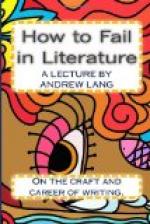The ways of failure are infinite, and of course are not nearly exhausted. One good plan is never to be yourself when you write, to put in nothing of your own temperament, manner, character—or to have none, which does as well. Another favourite method is to offer the wrong kind of article, to send to the Cornhill an essay on the evolution of the Hittite syllabary, (for only one author could make that popular;) or a sketch of cock fighting among the ancients to the Monthly Record; or an essay on Ayahs in India to an American magazine; or a biography of Washington or Lincoln to any English magazine whatever. We have them every month in some American periodicals, and our poor insular serials can get on without them: “have no use for them.”
It is a minor, though valuable scheme, to send poems on Christmas to magazines about the beginning of December, because, in fact, the editors have laid in their stock of that kind of thing earlier. Always insist on seeing an editor, instead of writing to him. There is nothing he hates so much, unless you are very young and beautiful indeed, when, perhaps, if you wish to fail you had better not pay him a visit at the office. Even if you do, even if you were as fair as the Golden Helen, he is not likely to put in your compositions if, as is probable, they fall much below the level of his magazine.
A good way of making yourself a dead failure is to go about accusing successful people of plagiarising from books or articles of yours which did not succeed, and, perhaps, were never published at all. By encouraging this kind of vanity and spite you may entirely destroy any small powers you once happened to possess, you will, besides, become a person with a grievance, and, in the long run, will be shunned even by your fellow failures. Again, you may plagiarise yourself, if you can, it is not easy, but it is a safe way to fail if you can manage it. No successful person, perhaps, was ever, in the strict sense, a plagiarist, though charges of plagiary are always brought against everybody, from Virgil to Milton, from Scott to Moliere, who attains success. When you are accused of being a plagiarist, and shewn up in double columns, you may be pretty sure that all this counsel has been wasted on you, and that you have failed to fail, after all. Otherwise nobody would envy and malign you, and garble your book, and print quotations from it which you did not write, all in the sacred cause of morality.
Advice on how to secure the reverse of success should not be given to young authors alone. Their kinsfolk and friends, also, can do much for their aid. A lady who feels a taste for writing is very seldom allowed to have a quiet room, a quiet study. If she retreats to her chill and fireless bed chamber, even there she may be chevied by her brothers, sisters, and mother. It is noticed that cousins, and aunts, especially aunts, are of high service in this regard. They never give an intelligent woman an hour to herself.




